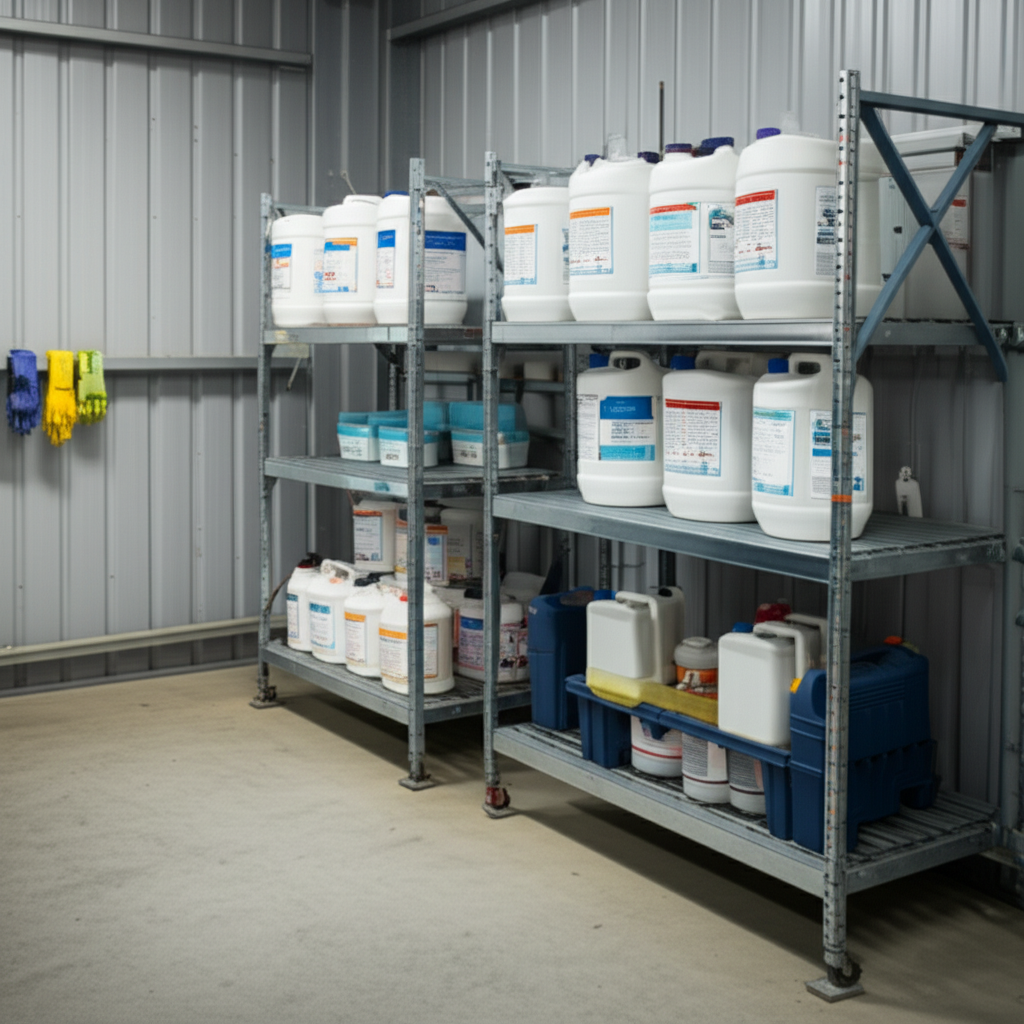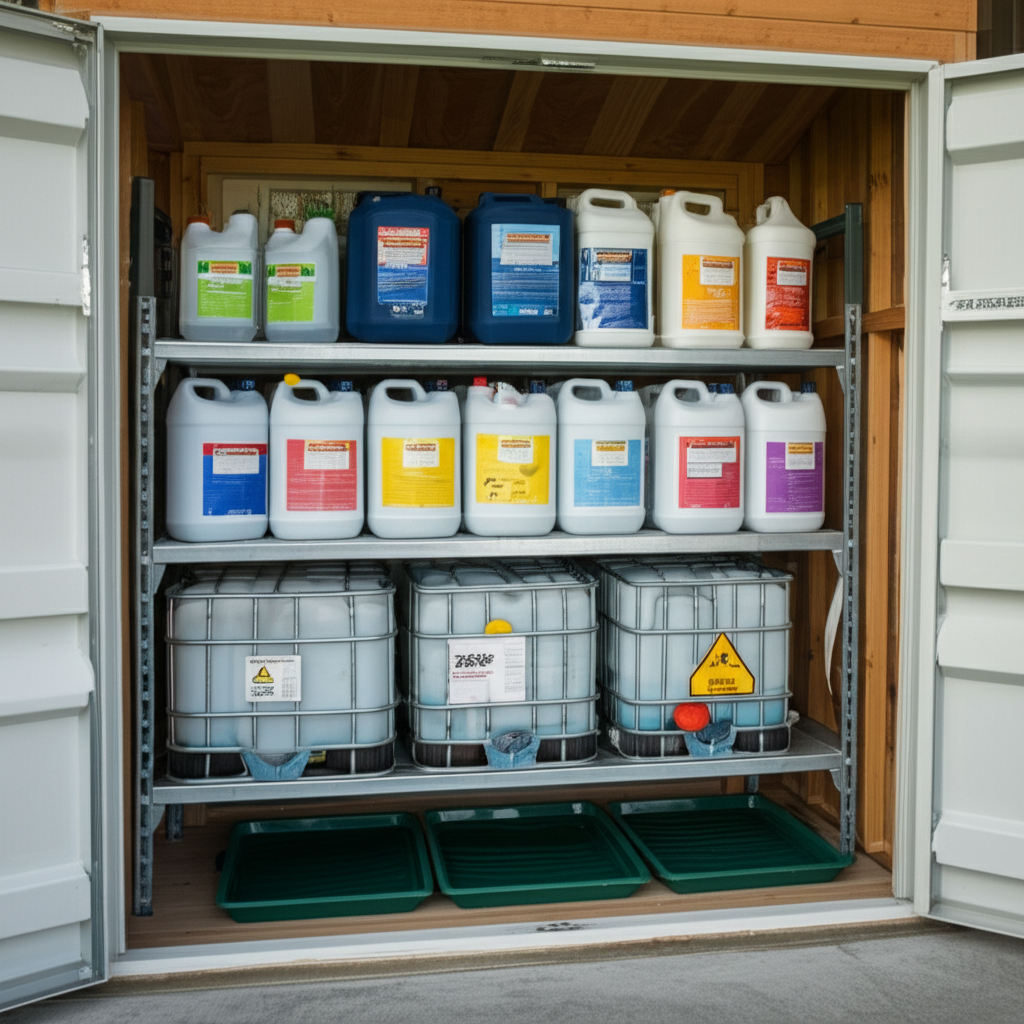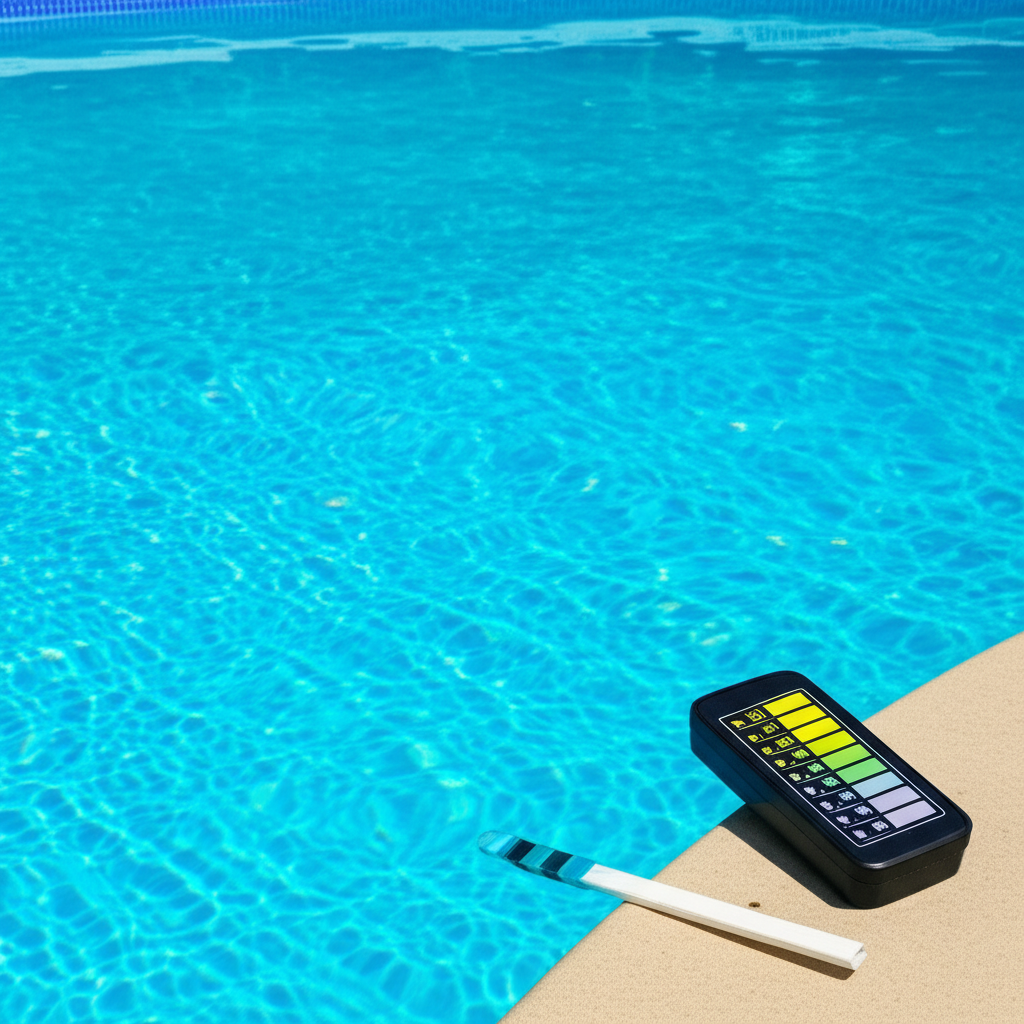- The Hidden Dangers of Improper Storage
- Principles of Safe Pool Chemical Storage
- Best Practices for Pool Chemical Storage
- Beyond Storage: Safe Handling and Disposal
Chemical Storage is not merely a recommendation; it is an absolute imperative for safeguarding your loved ones, your property, and the environment around your swimming pool. While a sparkling blue pool promises summer fun and relaxation, the chemicals required to maintain its pristine condition can pose significant hazards if not handled and stored with the utmost care. Neglecting proper storage protocols can lead to a range of severe consequences, from minor irritations to catastrophic accidents involving fires, explosions, or toxic gas releases. Understanding and implementing a robust chemical storage strategy is therefore a foundational element of responsible pool ownership and paramount for overall pool safety.
The Hidden Dangers of Improper Storage
The chemicals used to sanitize and balance pool water are potent substances by nature. Chlorine, for instance, is a powerful oxidizer, while pH adjusters can be strong acids or bases. When these chemicals are not stored correctly, they can present several serious risks:
Fire and Explosion Hazards: Many pool chemicals, particularly granular chlorine (calcium hypochlorite) and liquid chlorine (sodium hypochlorite), are highly reactive. If they come into contact with incompatible materials, organic matter, or even other pool chemicals, a violent reaction can occur, leading to fires or explosions. Heat and direct sunlight can also accelerate these reactions.
Toxic Fume Release: Mixing incompatible chemicals, even inadvertently through spills or leaks, can generate highly toxic gases. For example, mixing chlorine with an acid can produce chlorine gas, which is extremely dangerous if inhaled, causing severe respiratory damage and potentially death.
Skin and Eye Injuries: Direct contact with concentrated pool chemicals can cause severe burns, irritation, and permanent damage to skin and eyes. This risk is amplified when containers are compromised or chemicals are stored within easy reach.
Environmental Contamination: Spills or leaks can pollute soil and water sources, harming local ecosystems and potentially contaminating drinking water supplies.
Child and Pet Access: Curious children and pets are particularly vulnerable to chemical exposure. Storing chemicals in unsecured locations makes accidental ingestion or contact a terrifying possibility.
Principles of Safe Pool Chemical Storage
Adhering to a stringent set of guidelines for chemical storage is non-negotiable for anyone maintaining a swimming pool. These principles form the bedrock of a secure and responsible approach:
1. Segregation is Key: Never, under any circumstances, store different types of pool chemicals together. Oxidizers (like chlorine) must be kept separate from acids, bases, and other reducing agents. Ideally, they should be in entirely separate cabinets or areas to prevent accidental mixing.
2. Original, Labeled Containers: Always keep chemicals in their original, clearly labeled containers. Transferring chemicals to unmarked containers is a dangerous practice that can lead to confusion and incorrect mixing. Ensure labels are legible and not damaged by moisture or spills.
3. Ventilation is Vital: Store chemicals in a well-ventilated area to prevent the buildup of fumes. Garages, sheds, or dedicated chemical storage cabinets should have adequate airflow. Avoid confined, unventilated spaces.
4. Temperature Control: Store chemicals in a cool, dry place, away from direct sunlight and sources of heat (e.g., furnaces, water heaters). High temperatures can degrade chemicals, reduce their effectiveness, and increase the risk of dangerous reactions.
5. Secure and Elevated Storage: All pool chemicals should be stored in a locked cabinet or secure area, completely out of reach of children and pets. This might mean installing child-proof locks or using dedicated outdoor storage bins that are robust and difficult to access. Storing containers off the floor can also protect them from flood damage.
6. Limiting Quantity: Only purchase and store the amount of chemicals you reasonably need for one season or a specific period. Storing excessive quantities increases the potential risk in the event of an accident.
Best Practices for Pool Chemical Storage
Beyond the fundamental principles, specific practices can further enhance the safety of your pool chemical storage setup.
Dedicated Storage Area: Designate a specific, exclusive area for storing pool chemicals. This ensures chemicals are not inadvertently mixed with other household items, paints, or automotive fluids, which can also be reactive.
No Food or Drink Near Chemicals: Never store food, beverages, or eating utensils in the same area as pool chemicals. Accidental contamination or confusion could lead to serious harm.
Regular Inventory and Inspection: Periodically check your chemical containers for leaks, damage, or degradation. Dispose of expired or compromised chemicals according to local regulations. Ensure all lids are tightly sealed after each use.
Personal Protective Equipment (PPE): Store appropriate PPE, such as chemical-resistant gloves and eye protection, alongside your chemicals. This ensures you have the necessary gear readily available when handling chemicals.
Have a Spill Kit Ready: Keep an emergency spill kit accessible. This should include absorbent materials (like kitty litter or commercial absorbents), a broom and dustpan, and heavy-duty plastic bags for cleanup of minor spills. Know how to neutralize specific chemical spills safely, if appropriate, or how to contact emergency services for larger incidents.
* Emergency Information: Post emergency contact numbers (Poison Control, local fire department) prominently near your chemical storage area. Familiarize yourself with the Material Safety Data Sheets (MSDS) for all your pool chemicals, which provide detailed information on safe handling, storage, and emergency procedures.
Beyond Storage: Safe Handling and Disposal
Effective chemical safety extends beyond storage to include best practices for handling and disposal. Always add chemicals to water, never water to chemicals, especially when dealing with chlorine, as this can cause a violent reaction. Dilute slowly and carefully, wearing your PPE. For expired or contaminated chemicals, never dispose of them in household trash or pour them down drains. Contact your local waste management facility for specific guidelines on hazardous waste disposal. Their expertise will ensure the chemicals are handled safely and responsibly, preventing environmental harm.
In conclusion, maintaining a swimming pool requires diligence and respect for the chemicals that keep it clean and safe for swimming. By adhering to strict guidelines for Chemical Storage, implementing best practices for handling, and promoting ongoing awareness, pool owners can significantly mitigate risks and create an environment where pool enjoyment always comes first, without compromise to safety. Prioritizing correct storage ensures that your pool’s inviting sparkle is matched by a secure and hazard-free operation.



